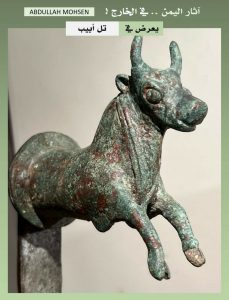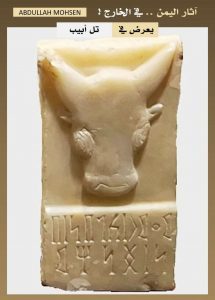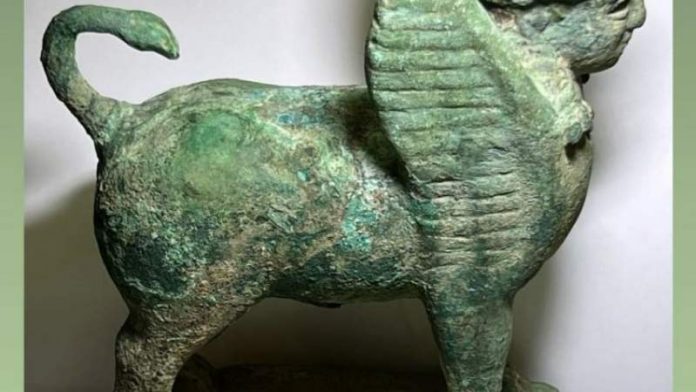The Yemeni researcher and specialist in tracing the looted antiquities of Yemen, Abdullah Mohsen, revealed new details about the Israeli preparations to display a group of unique Yemeni antiquities at a public auction in Tel Aviv in early October.
Researcher Mohsen explained, in a post on Facebook, that Tel Aviv is preparing for auction on October 2, 2023, for the sale of four distinctive antiques of bronze and calcite alabaster, two of which contain Musnad inscriptions.

He pointed out that one of the artefact is similar to another artifact sold at Christie’s New York auction on June 9, 2011, for forty thousand dollars, from a private Belgian collection. It is similar to another piece sold at the Lyon and Turnbull auction in London in May 31, 2023. It resembles another piece preserved in the Smithsonian Museum in the United States, as well as another similar piece to it sold at Sotheby’s auction in December 2021 from the famous Anthony Pace collection.

According to researcher Mohsen, the rest of the artifacts are distributed among bronzes and tombstones of alabaster of the kind that we see in auctions and museums. “I will publish more details when the auction house displays these artifacts next month on the net before the official launch of the auction.”
The smuggling and sale of Yemen’s antiquities has flourished in global auctions recently, from the US to Britain, France and Germany to the Zionist enemy entity, after the aggression coalition focused during the past years on destroying immutable antiquities with its criminal raids and the demolition shovels of its takfiri tools.
Smuggling does not only include pieces that were stolen from museums, but also from random excavations of archaeological sites. Therefore, there is no specific statistics on the number of smuggled antiquities, although estimates indicate that thousands of rare pieces and manuscripts were smuggled.
Collecting the fragments of Yemeni antiquities seems impossible because those who claim to protect the history of Yemen, its treasures and collectibles abroad are trading and promoting them, exploiting their control over the occupied areas and their control over airports, land and sea ports.
The bleeding of antiquities smuggling will remain relentless, unless Yemen achieves its independence, and the arduous task remains in tracking down these antiquities in auctions and black markets, and engaging in dozens of judicial disputes to recover them.




















